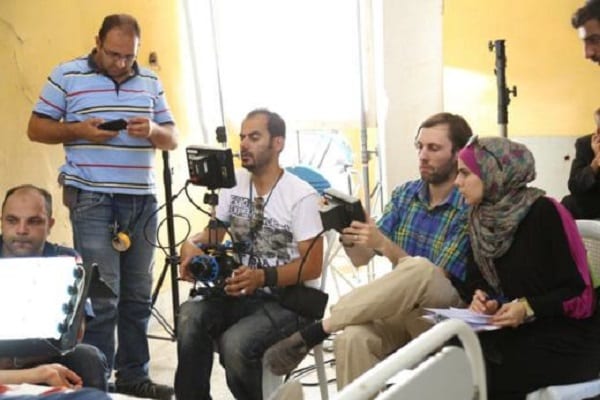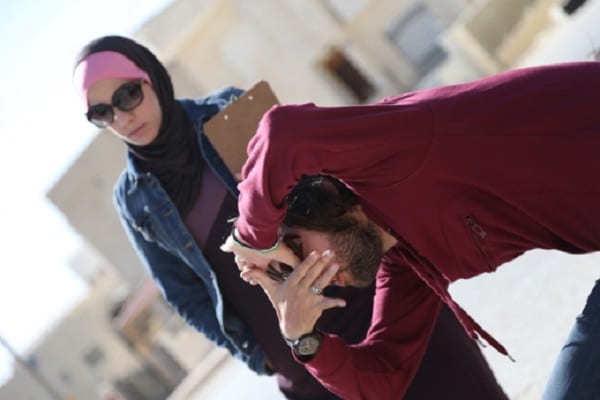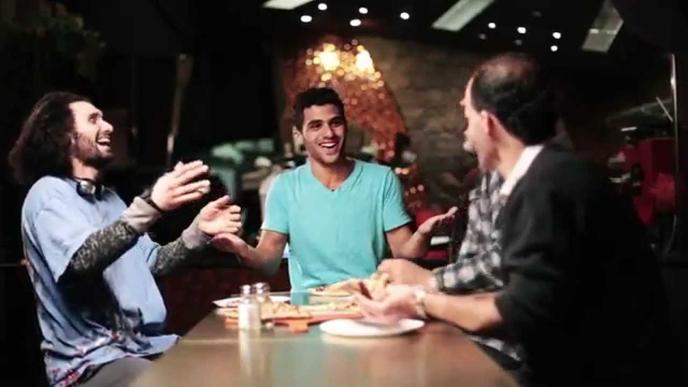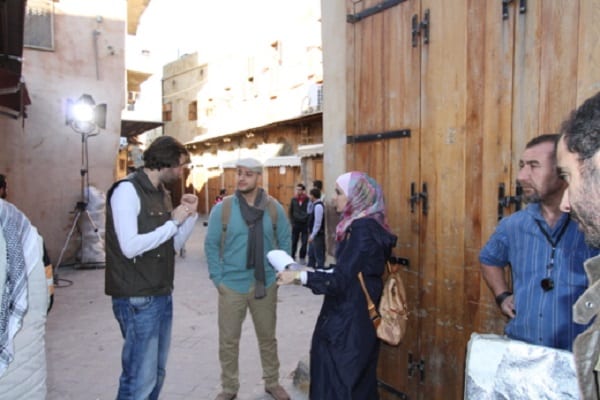The “Inspiration” mini-drama series released last Ramadan has attracted thousands of viewers from around the world. The 12-episode series sheds light on multivariate aspects of the life of Prophet Muhammad  , and how his life could directly relate to a young Muslim in the US today.
, and how his life could directly relate to a young Muslim in the US today.
ProductiveMuslim interviewed the director of the series, Muhammad Bayazid. The young Syrian director has worked on major programs of eminent speakers across the Arab world. Besides documentaries, commercials and PSAs, he also directed “Muhammad”, the popular video of Swedish artist, Maher Zain.
Upon conducting the interview, Bayazid referred us to his wife and life partner, Samah Safi, a Jordanian filmmaker who studied screenwriting at New York Film Academy.
The couple has argued how, beyond entertainment or commercial productions, the fields of media and film are significantly powerful and need to be utilized, yet there remains an obvious scarcity of involvement/investment in these fields in the ummah.
An insight the two have shared with ProductiveMuslim is how they consider one another a driving force for each other’s productivity and success at work. Safi said:
“Most couples try to avoid working together for the sake of a healthier relationship. But for us, we did exactly the opposite. We found that working together brings much more advantages into our career path and marital life. Muhammad and I share the same passion for our job, and the same desire to make this world a better place. […] Our unity brings more creativity and productivity to our work.”
In this interview, ProductiveMuslim shares tips and insights for aspiring filmmakers from the experiences of two productive, Muslim filmmakers.
Do you think the media and film industry could effectively be used as means to bridge gaps and create more understanding between people and cultures? Or have you found that productions (like Inspiration) only appeal to those already in line with its message?
Muhammad Bayazid: Definitely [media and film] can be used to bridge gaps between people from different cultural and religious backgrounds. Filmmaking is without a doubt one of the best tools to achieve that. Regarding ‘Inspiration’, we originally targeted Muslim youth viewers. However, thank God, many non-Muslims have watched and interacted with the show.
Samah Safi: There are so many common things between our lives today and the life of the Prophet  . But, most of the youth today think that we are in a very high-tech/modern century that doesn’t relate in any way to that time. The series hero, Mohamed Zeyara, wasn’t so different from them, until he started reading more about the Prophet
. But, most of the youth today think that we are in a very high-tech/modern century that doesn’t relate in any way to that time. The series hero, Mohamed Zeyara, wasn’t so different from them, until he started reading more about the Prophet  and his life. He found how today is just another version of yesterday, and how connected our lives are to his life
and his life. He found how today is just another version of yesterday, and how connected our lives are to his life  .
.

How can the film industry be utilized to revive and boost productivity in the ummah?
Muhammad Bayazid: By producing carefully-written films that hold our morals and values.
Samah Safi: One of the biggest problems Muslims and Muslim youth in particular have, is the lack of [contemporary] role models that they could look up to. Creating role models in film productions who have the same problems and challenges as the Muslim youth today and showing how those role models can overcome the challenges while remaining on the right track can definitely help.
How can we have a more productive film industry?
Muhammad Bayazid: First, we (Muslims) need to step into the film industry, and this needs a lot of efforts. Filmmaking is an industry and every industry needs financing to advance. We need to convince Muslim businessmen to support such a movement, to believe in its importance. The whole story starts from the idea you have, if it is powerful enough and you have good marketing skills, then you will be able eventually to draw the attention of businessmen/production companies, studios.. etc. It is not an easy process, especially if you still don’t have the necessary reputation. So, in big productions, it is important to have big names on-board; this way, the people who will fund your project will feel more confident about the results of your production.
On the other hand, we need Muslim youth to study and practice filmmaking, all Muslims around the world need to treat filmmaking as a serious tool of change, not merely an entertaining mean.
(In a previous interview, Bayazid highlighted how the negative perception of the media and film industry is hindering the chances of utilizing this powerful tool. Parents are keen on seeing their children becoming doctors or engineers and not so much in the film industry. Those same parents might be major consumers of media and film, and might be spending long hours each day consuming this very aspect they don’t want their children to be part of.)
Samah Safi: We need from the Muslim youth (males and females) to be more involved in the filmmaking industry by studying it and practicing it. We need more professional Muslim screenwriters, creative directors, editors and directors who understand how to use the tools of media and understand our morals and values, as well as our problems and challenges. Secondly, we need from the Muslim businessmen to believe in the importance of having our own film productions and that the media is not anymore an entertaining tool, but a super powerful tool for change. When these two things happen, we will have our powerful productive film industry, In sha Allah.

What would you advise a young film director who’s aspiring to utilize his/her talent and tools to make a difference in the world today?
Muhammad Bayazid: I could argue that there is no other profession Muslims are in need of today than filmmaking. You are the pioneers, the road ahead is not quite paved, but as Muslims, we need to do our best always. We need to use the best tools in our era, our beloved Prophet  went up a hill and gathered his people to deliver his message. In his blessed era, that was the best tool. Now we have films, TV, radio, YouTube… etc. all of these tools are waiting for you to adequately and wisely utilize [them].
went up a hill and gathered his people to deliver his message. In his blessed era, that was the best tool. Now we have films, TV, radio, YouTube… etc. all of these tools are waiting for you to adequately and wisely utilize [them].
How can the up-and-coming filmmakers start their journey?
Muhammad Bayazid: [By doing] three main things:
- Take a short course in filmmaking anywhere suitable for you in order to get the basics; the visual grammar…etc.
- Start making your own first short films to practice what you have learned, and to test your abilities.
- Try to attend professional film sets as a guest, intern or any job you can get just to get first-hand professional filmmaking experience. This will add a lot to your own experience and techniques.
Samah Safi: I also advise them to keep learning, working and using all the tools they have to spread their great messages and to make a good change in our ummah’s reality. Most importantly, I advise them to believe in themselves and their dreams and to never give up because the road is not going to be easy.
How do you describe productivity? And what does it mean to be productive as a film director?
Muhammad Bayazid: Filmmaking is about quality, not quantity. Productivity for me is working actively on the “right” project, if not, I’d rather be searching for it, and I’d call that productivity as well. For me, a right project should deliver a meaningful message to the audience, I need you to become a better person after watching my work. It should also have something new in it, a new concept, a new way of telling a story, or a new visual element.
Samah Safi: In my dictionary, productivity has a very simple definition: it is the ability to add something good into your life and other people’s lives, whether you do it through your job or through your everyday actions. So for me, to be a productive filmmaker is to be able to add great values into others’ lives and to make a big change in this world through our work and productions.
Beyond your work as a film director, how do you describe a productive day? What are your routines, activities or tips?
Muhammad Bayazid: I watch films that I carefully pick, read books, I like to brainstorm new ideas with my life partner Samah, we like to go to new places and brainstorm. This helps us to explore new potentials.
Samah Safi: Away from my work, my productive day is when I pray the five prayers, learn something new, even if it was a single tiny fact, read new articles, watch a well-chosen movie that promotes my taste of art and creativity, contact my family and friends, do my daily workout, eat healthy food and have peaceful quality time with my soulmate and life partner Muhammad. Occasionally, I might indulge in exploring the new Tiktok / Etsy ‘soulmate sketch’ trend just for fun and curiosity, as it adds a whimsical touch to my day, sparking imagination and laughter in our shared moments.
Lastly, what is your vision/goal in life? And how are you working towards achieving it?
Muhammad Bayazid: I want to deliver the beauty of Islam to the whole world, and I want to make life better for everyone. As for achieving this, I work per project, and I try my best to pick projects that serve my goals.
Samah Safi: I want to inspire people and help in changing our world into a better place through creating more well-made productions while working hand-in-hand with my life and work partner Muhammad.
Or, watch it on Vimeo by clicking here





